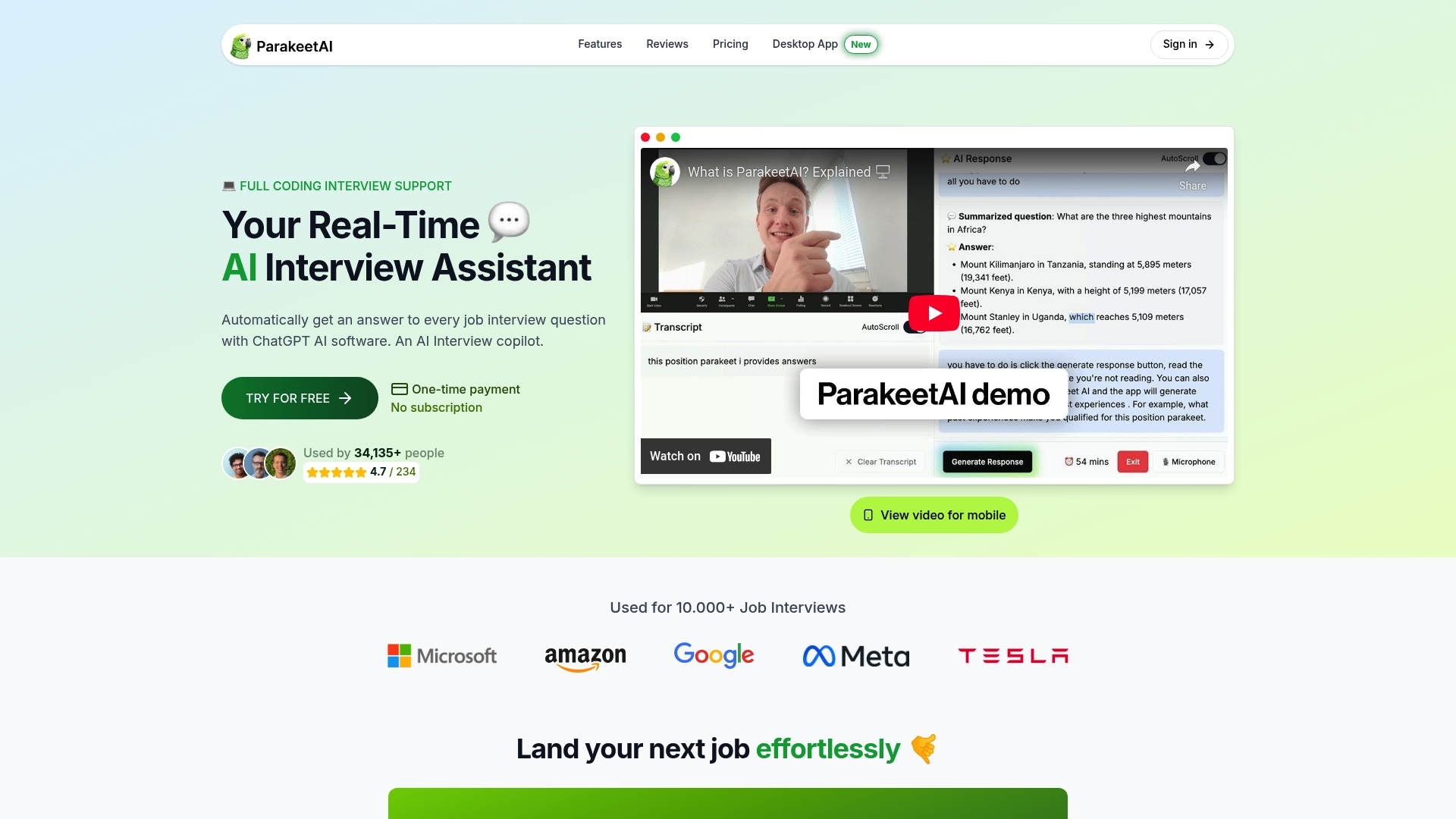Why Interview Preparation Matters: Complete Guide

Successful job seekers know that interviews are never left to chance. Studies show that prepared candidates are up to 40 percent more likely to receive offers, a fact that shapes how american professionals approach their career goals. The real difference comes down to strategy, research, and a willingness to invest in personal growth. This guide breaks down the smart steps that transform an ordinary interview into a standout moment for your professional story.
Table of Contents
- Why Interview Preparation Matters
- Psychological Benefits And Performance
- Common Misconceptions About Preparation
- Role Of Mock Interviews
- Real‑World Impacts Of Prepared Candidates
Key Takeaways
| Point | Details |
|---|---|
| Importance of Preparation | Strategic interview preparation enhances self-awareness, research skills, and confidence, leading to better performance. |
| Psychological Readiness | Emotional intelligence and managing psychological states can significantly improve interview outcomes. |
| Common Misconceptions | Believing that memorization alone suffices or that charisma is enough can undermine effective preparation. |
| Benefits of Mock Interviews | Mock interviews provide a safe space to build confidence and receive feedback, transforming weaknesses into strengths. |
Why Interview Preparation Matters
Successful interviewing isn’t about luck - it’s about strategic preparation. According to Yale School of Management, interview preparation is comparable to how athletes and performers train extensively before their big moment. Just like a professional athlete wouldn’t walk onto the field without practice, job candidates shouldn’t enter an interview unprepared.
Preparing for an interview goes far beyond memorizing responses. Research and self-awareness are critical components that can dramatically improve your chances of success. Colgate University emphasizes that candidates must deeply understand themselves, the position, and the organization to demonstrate genuine suitability for the role. This means conducting comprehensive research about the company, understanding the job description, and being ready to articulate how your skills align with their needs.

Effective interview preparation involves several strategic approaches:
- Practicing common interview questions
- Researching the company’s recent achievements and culture
- Preparing specific examples that highlight your professional accomplishments
- Developing thoughtful questions to ask your interviewer
- Rehearsing your professional narrative and key talking points
By investing time in preparation, you transform an intimidating interaction into an opportunity to showcase your unique professional value. You’ll enter the interview with confidence, clarity, and a compelling narrative that sets you apart from other candidates. Remember, interviews are not just about answering questions - they’re about telling your professional story in a way that resonates with potential employers.
Psychological Benefits And Performance
Interviews are more than just professional assessments - they are profound psychological experiences that can significantly impact personal confidence and career trajectory. The Open University highlights that understanding psychological strategies can dramatically transform interview performance, with nonverbal communication playing a crucial role in creating positive impressions.
Emotional intelligence and psychological preparation are key differentiators in successful interviews. Research from PubMed reveals fascinating insights, demonstrating that candidates who effectively manage their psychological state during interviews not only perform better but also develop enhanced emotional resilience. This psychological readiness helps individuals navigate high-pressure situations with greater composure and self-assurance.
The psychological benefits of thorough interview preparation extend far beyond the immediate interaction:
- Reduced anxiety and stress levels
- Increased self-confidence
- Enhanced ability to articulate thoughts clearly
- Improved emotional regulation
- Greater adaptability in challenging conversations
By recognizing interviews as opportunities for personal growth rather than mere evaluations, candidates can reframe their mindset. This shift transforms interviews from intimidating encounters into platforms for professional storytelling, self-discovery, and meaningful connection. The psychological work you do beforehand determines not just your interview performance, but potentially your entire career trajectory.
Common Misconceptions About Preparation
Many job seekers approach interviews with dangerous misconceptions that can significantly undermine their performance. Impactpool highlights a critical misunderstanding about competency-based interviews: candidates often believe generic, broad responses will suffice. In reality, interviewers expect specific, detailed examples that demonstrate actual skills and experiences.
One prevalent myth is that preparation means memorizing scripted answers. This approach backfires spectacularly. Authentic interview success requires understanding the underlying principles of effective communication, not rehearsing robotic responses. Genuine preparation involves developing a flexible narrative that allows you to adapt to different questions while maintaining the core strength of your professional story.
Here are some common misconceptions that can derail interview preparation:
- Believing that natural charisma is enough to win an interview
- Thinking that last-minute cramming is equivalent to thorough preparation
- Assuming all interviews follow the same predictable format
- Underestimating the importance of company and role-specific research
- Dismissing the value of practicing with mock interviews
Effective interview preparation is a nuanced process of self-reflection, strategic planning, and continuous improvement. It’s not about creating a perfect performance, but about developing the confidence and adaptability to present your most authentic professional self. The goal is to transform interviews from intimidating encounters into meaningful conversations where you can genuinely showcase your potential.
Role Of Mock Interviews
Coursera reveals a powerful truth about interview preparation: mock interviews are transformative experiences that go far beyond simple practice sessions. They are sophisticated training grounds where candidates can systematically deconstruct and rebuild their professional presentation, turning potential weaknesses into strengths before stepping into an actual interview.
Psychological simulation plays a crucial role in mock interview effectiveness. According to Oak Ridge Institute for Science and Education, these simulated interactions provide a safe environment for candidates to confront and overcome interview anxiety, build confidence, and receive personalized feedback that traditional preparation methods cannot offer.
The multifaceted benefits of mock interviews include:
- Identifying and correcting communication blind spots
- Developing muscle memory for professional responses
- Learning to manage unexpected or challenging questions
- Reducing performance anxiety through repeated exposure
- Gaining objective insights from experienced interviewers
Mock interviews are not about achieving perfection, but about creating a dynamic learning environment. They represent a critical bridge between theoretical preparation and real-world performance, allowing candidates to experiment, learn, and refine their approach in a low-stakes setting. By treating each mock interview as a laboratory for professional growth, job seekers can transform their interview skills from uncertain and reactive to confident and proactive.
Real‑World Impacts Of Prepared Candidates
Lewis University’s Writing Center reveals a compelling truth about interview preparation: thoroughly prepared candidates dramatically transform their professional trajectories. Preparation is not just about memorizing answers, but about creating a comprehensive understanding of one’s professional narrative and potential value to an organization.
Strategic research plays a critical role in candidate performance. According to the National Research Centre for Mechanical Engineering Careers, candidates who invest time understanding the job role and practicing technical knowledge significantly increase their chances of securing positions. This preparation goes beyond surface-level readiness, creating a deep, nuanced approach to professional representation.
The real-world impacts of thorough interview preparation include:
- Higher likelihood of job offer acceptance
- More confident and articulate communication
- Better alignment with organizational culture
- Enhanced ability to showcase relevant skills
- Improved negotiation capabilities during hiring process
Prepared candidates stand out not just through their technical competence, but through their holistic professional approach. They demonstrate an ability to think critically, communicate effectively, and align their personal career goals with organizational objectives.

By treating interviews as strategic conversations rather than interrogations, well-prepared candidates transform potential challenges into opportunities for meaningful professional connection.
Master Your Interview With Real-Time AI Support
Facing the anxiety and complexity of interviews requires more than just memorized answers. The article highlights the importance of strategic preparation, psychological readiness, and dynamic practice to overcome stress and showcase your authentic professional value. If you want to break free from misconceptions like last-minute cramming or robotic responses and gain confidence through tailored feedback, embracing innovative tools is key.

Experience a new level of interview preparation with a real-time AI assistant that listens, understands, and provides instant answers to your interview questions. This transformational approach helps you build emotional resilience, sharpen your responses, and adapt naturally to any question. Visit Parakeet AI Interview Assistant now and start turning your interview challenges into opportunities. Don’t wait until the pressure mounts take control of your narrative and prepare smarter today.
Frequently Asked Questions
Why is interview preparation important?
Successful interview preparation is crucial as it transforms an intimidating situation into an opportunity to showcase your professional value. It helps you articulate your skills, demonstrates your understanding of the company, and significantly increases your chances of getting hired.
What should I research before an interview?
Before an interview, you should research the company’s recent achievements, its culture, and the specific job description. Understanding these elements helps you align your skills and experiences with the organization’s needs.
How can mock interviews help me prepare for a real interview?
Mock interviews simulate the interview experience, allowing you to practice your responses, identify communication blind spots, and reduce interview anxiety. They provide constructive feedback that helps refine your professional narrative.
What are some common misconceptions about interview preparation?
Common misconceptions include believing that charisma alone can win an interview, thinking last-minute cramming is sufficient, and underestimating the importance of tailored responses over generic ones. Effective preparation requires a nuanced understanding of both the job and self-awareness.




